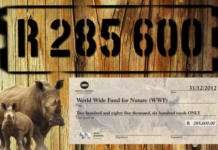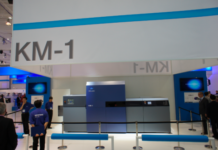Africa Print, representatives from the press and Konica Minolta South Africa attended the hand over of another cheque, worth R327 300, to Dr Joseph Okori, head of World Wildlife Funds African Rhino Programme last week Friday. It is encouraging to see the support that Konica Minolta has given so far as well as their ongoing commitment to the programme.
Konica Minolta South Africas support of the World Wildlife Funds (WWF) rhino conservation programme is enabling RhODIS (Rhino DNA Index System) to expand its reach into Botswana, Zimbabwe, Kenya and Namibia – and now India has expressed interest in this rhino DNA database too. RhODIS is a rhino DNA database that is used as a tool to protect the rhino and is similar to the Combined DNA Index System (CODIS), which the FBI uses.
The DNA profiles are obtained directly from the rhino horn. The database has DNA profiles from rhino from national and provincial parks and private owners in South Africa; DNA profiles from all poaching cases; profiles from recovered horns and stockpile horns and profiles from rhinos from Zimbabwe, Botswana, Kenya and Namibia. The RhODIS database currently consists of 4500 samples. These DNA profiles serve as a traceability tool and horn identification method, so the profiling is a forensic tool to assist rhino poaching investigations.
Profiles can be used as evidence in poaching cases, as the horn, which has been seized or recovered, can be traced back to the poached rhino, linking the poachers to the rhino. The laboratory also uses other evidence such as knives, pangas and other evidence from poaching cases. As little as 20mg of rhino horn can be obtained as DNA, making it a very powerful traceability tool. As a bonus, the system can also be used to manage animals genetically so that owners know which bull is fathering their calves, etc.

















